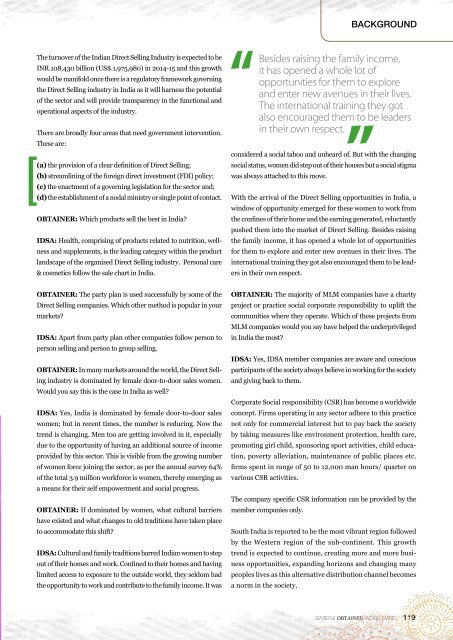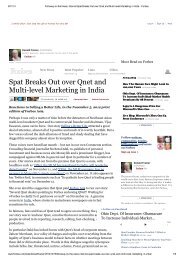OBTAINER - QNET
You also want an ePaper? Increase the reach of your titles
YUMPU automatically turns print PDFs into web optimized ePapers that Google loves.
The turnover of the Indian Direct Selling Industry is expected to be<br />
INR.108,430 billion (US$.1,975,980) in 2014-15 and this growth<br />
would be manifold once there is a regulatory framework governing<br />
the Direct Selling industry in India as it will harness the potential<br />
of the sector and will provide transparency in the functional and<br />
operational aspects of the industry.<br />
There are broadly four areas that need government intervention.<br />
These are:<br />
(a) the provision of a clear definition of Direct Selling;<br />
(b) streamlining of the foreign direct investment (FDI) policy;<br />
(c) the enactment of a governing legislation for the sector and;<br />
(d) the establishment of a nodal ministry or single point of contact.<br />
<strong>OBTAINER</strong>: Which products sell the best in India?<br />
IDSA: Health, comprising of products related to nutrition, wellness<br />
and supplements, is the leading category within the product<br />
landscape of the organized Direct Selling industry. Personal care<br />
& cosmetics follow the sale chart in India.<br />
<strong>OBTAINER</strong>: The party plan is used successfully by some of the<br />
Direct Selling companies. Which other method is popular in your<br />
markets?<br />
IDSA: Apart from party plan other companies follow person to<br />
person selling and person to group selling.<br />
<strong>OBTAINER</strong>: In many markets around the world, the Direct Selling<br />
industry is dominated by female door-to-door sales women.<br />
Would you say this is the case in India as well?<br />
IDSA: Yes, India is dominated by female door-to-door sales<br />
women; but in recent times, the number is reducing. Now the<br />
trend is changing. Men too are getting involved in it, especially<br />
due to the opportunity of having an additional source of income<br />
provided by this sector. This is visible from the growing number<br />
of women force joining the sector, as per the annual survey 64%<br />
of the total 3.9 million workforce is women, thereby emerging as<br />
a means for their self empowerment and social progress.<br />
<strong>OBTAINER</strong>: If dominated by women, what cultural barriers<br />
have existed and what changes to old traditions have taken place<br />
to accommodate this shift?<br />
IDSA: Cultural and family traditions barred Indian women to step<br />
out of their homes and work. Confined to their homes and having<br />
limited access to exposure to the outside world, they seldom had<br />
the opportunity to work and contribute to the family income. It was<br />
BACKGROUND<br />
Besides raising the family income,<br />
it has opened a whole lot of<br />
opportunities for them to explore<br />
and enter new avenues in their lives.<br />
The international training they got<br />
also encouraged them to be leaders<br />
in their own respect.<br />
considered a social taboo and unheard of. But with the changing<br />
social status, women did step out of their houses but a social stigma<br />
was always attached to this move.<br />
With the arrival of the Direct Selling opportunities in India, a<br />
window of opportunity emerged for these women to work from<br />
the confines of their home and the earning generated, reluctantly<br />
pushed them into the market of Direct Selling. Besides raising<br />
the family income, it has opened a whole lot of opportunities<br />
for them to explore and enter new avenues in their lives. The<br />
international training they got also encouraged them to be leaders<br />
in their own respect.<br />
<strong>OBTAINER</strong>: The majority of MLM companies have a charity<br />
project or practice social corporate responsibility to uplift the<br />
communities where they operate. Which of these projects from<br />
MLM companies would you say have helped the underprivileged<br />
in India the most?<br />
IDSA: Yes, IDSA member companies are aware and conscious<br />
participants of the society always believe in working for the society<br />
and giving back to them.<br />
Corporate Social responsibility (CSR) has become a worldwide<br />
concept. Firms operating in any sector adhere to this practice<br />
not only for commercial interest but to pay back the society<br />
by taking measures like environment protection, health care,<br />
promoting girl child, sponsoring sport activities, child education,<br />
poverty alleviation, maintenance of public places etc.<br />
firms spent in range of 50 to 12,000 man hours/ quarter on<br />
various CSR activities.<br />
The company specific CSR information can be provided by the<br />
member companies only.<br />
South India is reported to be the most vibrant region followed<br />
by the Western region of the sub-continent. This growth<br />
trend is expected to continue, creating more and more business<br />
opportunities, expanding horizons and changing many<br />
peoples lives as this alternative distribution channel becomes<br />
a norm in the society.<br />
07/2012 <strong>OBTAINER</strong> WORLDWIDE 119







